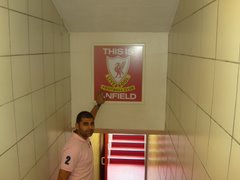5 tips for a good PPC campaign
PPC advertising is Pay Per Click. You know....those links at the top and on the right of a Google results page. When you click on those ads the advertiser pays.

For all those beginners who are toying with starting your own PPC campaign, here are 5 easy steps.
Ready for it??
- Get the structure right
- Get the structure right
- Get the structure right
- Get the structure right
- Get the structure right
The structure holds the key to the promise land.
What should you be striving to achieve?
The structure enables you to target your budget in the appropriate areas/campaigns. The big win is by having small groups of keywords with really relevant creative/messaging.
With Google and now Yahoo! rewarding advertisers for relevance and not by bidding, there is no room for lazy campaign set up.
OK, now we're ready for the whole picture!
- Set clear objectives
- Assign a budget
- What engine?
- Keywords
- Structure
- Target
What are you trying to achieve?
- Build your brand
- Increase traffic to your site
- Increase unique visitors
- Generate phone calls
- Generate online enquiries
- Generate online purchase/application
Now you have your objectives in place you'll need to get the budget signed off.
Once you have your budget in place you need to decide where it is best spent. If you're a small sole trader with £200 per month to spend then I would advise you advertise on Yahoo!
Now, you're probably saying "What about Google?".
Control your emotions! This is not the "Advertise your ego" blog. The Google brand is so powerful and plays a huge part in our every day life, it's easy for people to get carried away with seeing their ad on the famous Google search page.
The amount of Google searches means that there is always going to be more browsers.Researching vs. Buying
In many sectors Yahoo! achieves a better conversion rate but at a lower volume
If you are a big player with a sizeable amount of advertising budget then you may have to succumbe to the Google brand in order to get the volume you need.
Now to the keywords.....
- Long tail
- Generic
- Structure
Start building your keywords with long tail terms that are highly relevant to your business. Deeper buying could also include location specific terms.
You should look to spend your budget on the long tail terms and only add generic terms should you need additional volume.
Separate your terms as you go with the account structure in mind. This will make it easier for you to write effective creative that is specific to the group of keywords.
Example: Travel
Travel keywords should be split by location, type and activity. I.e. Cyprus - Holiday - Walking break, Majorca - Flight
The generic terms would be 'holiday', 'flights', 'cheap flights' etc. These terms will not only be more expensive but will eat up your budget quickly.
The more relevant your creative the better rank you will achieve. Lazy PPC advertisers will have unsuccessful campaigns without understanding the reasons.
Lastly, most important for the smaller advertisers, is to focus on where your target market is. If you are a builder you may want to start out locally. Focus on specific regions, this will also enhance your relevancy and will make your minimum CPC lower.
Happy search advertising. Watch out for more in depth nuggets coming soon.



